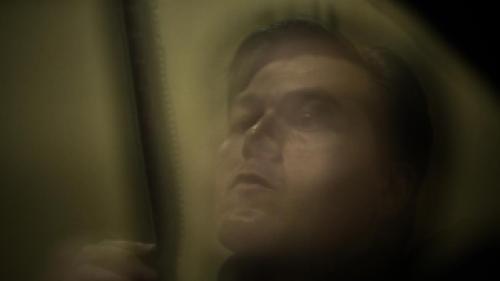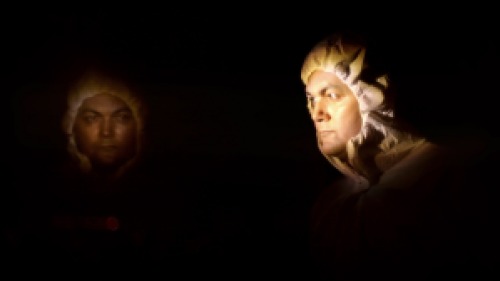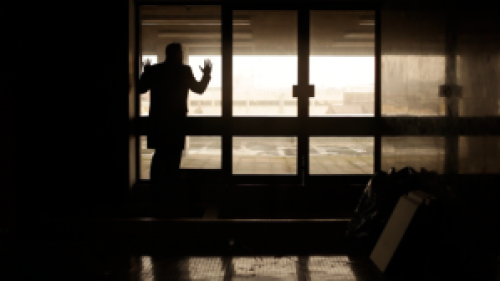The Great Acting Blog: “With And Without Object”
A large part of our work in Cork took place in a empty office block, which had an endless number of rooms, some of them empty, some of them littered with old paperwork and decaying furniture. The whole place had a weird, eerie psycho-geography, just right for the strange dream sequences we were to shoot there. In some respects however, these scenes were the easiest for me to act, largely because many of the tasks I was asked to perform were very simple: sometimes sifting through the debris, sometimes picking up some strange object and studying it, sometimes spraying the place with a fire extinguisher. For most of this work, Rashidi asked me not to have a specific objective, that I was performing these actions without a purpose. This meant that most of what I did I did mechanically – for example; in one room I walked into, I smashed a computer monitor, and I did so not with any anger or even any enthusiasm, but purely by going through the motions – no emotion, no inflection, no point of view. In another room, I had a sack which was full with shredded paper, and I grabbed clumps of this paper, and threw it at the walls, at the ceilings, at the windows, and once I had had enough of this throwing, I simply tossed the sack to one side, and walked off. Again, this was done without object, without intent, and purely mechanically. We worked on in this fashion, going through the various rooms, performing purposeless tasks. The net effect of this approach, was to give my work a certain robotic quality, there was no emotion on my part, nor indeed any kind of expression – very strange, but perhaps just right for the scenes we wanted to create.
Then Rashidi asked me to add a certain upbeat quality, which lead me to behave like some sort of red coat – walking with an exaggerated spring in my step, doing little dances, and which culminated in a little skit: there was a derelict reception desk, and I quickly improvised a scene as a hotel clerk trying to entertain would-be guests. However, during the skit, I did give myself an action: to entertain – which produced some lovely little moments, like when I tap danced on top of the desk. However, if my earlier work had been strange because of my lack of action, this skit was strange precisely because I did give myself an action: being an entertainer amid the dereliction and decay of this abandoned office block, is a slightly freaky combination.
REFLECTIONS ON HE
Both periods of filming, Cork and Dublin, have proved to be mentally exhausting, and not because we worked particularly long days (we didn’t), but because of the intensity of my commitment to the scenes. As an actor, I’m always thinking about how I can deliver something a little bit extra, something more. The audience is extremely important to me – I don’t view them as an appendage to my work (as many do)*, but the very reason for it: I want to delight them in the way that my favourite actors delight me. My work is always a presentation and a communication. As the great John Hurt once said, the actor needs to earn the trust of the audience, without which the dramatic interchange cannot take place. Audiences make themselves completely vulnerable to the actor – it’s a priveledged position we are in, and one we must not abuse, but cherish and serve as well as we can. HE has been extremely demanding because I set the bar high for myself in striving to go further, dig deeper, and find something extra. It’s also because the nature of the material required discipline and seriousness – my character’s intent to commit suicide always felt like a burden which needed to be carried, and the improvisations needed to be completely focussed. Rashidi will now take the film through the post-production process, and eventually send it out into the world. The next step for me, will be to watch the finished film, and analyse my work to see how I can improve for next time.
What is certain, is that HE is an important and concrete step on my way to becoming precisely the kind of actor I set out to become – an objective I will never compromise, despite the critcism and cynicism I regularly encounter, and despite the fact that I may occasionally take a wrong turning. It is especially difficult for an actor to create work on his own terms, perhaps more difficult than for any other artist. However, HE, and working with Rashidi, is the embodiment of the kind of actor-director relationship I’ve been calling for : the director trusts the actor and gives him room to create, while the actor serves the film (ie – the director’s vision) totally – a creative partnership**. It’s a richly rewarding way of working, which breeds trust and co-operation, which, in turn, means it’s a pleasure to crack open a beer with the director at the end of it all.
*as evidenced by the recent trend in the West End of London for actors to break out of the scene and tell noisy audience members to “shut-up” when they make a noise by eating a packet of crisps. How weak and spineless we have become. Old barnstormers like Anew Mcmaster would shut the audience up by the force sheer force of their performances, as when he stepped on stage before 2000 drunken, riotous Irish, but by the end of the play, they could hear a pin drop. An actor who is less interesting than a packet of crisps may want to think about a career change.
**Although we were using improvisations, this stills applies to fully scripted work – it’s a question of how actor and director view eachother, and their work.





James Devereaux/ 24.02.2012
We’ll confound those pesky crisp eaters yet! Yes, total commitment to the moment by the actor makes him vivid and intense, and therefore compelling to watch. It’s half hearted performances which lead us to reach for the junk food. Many thanks for your comment.
coffee relaxing jazz/ 11.01.2024
coffee relaxing jazz